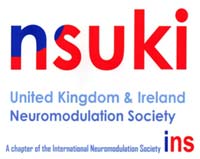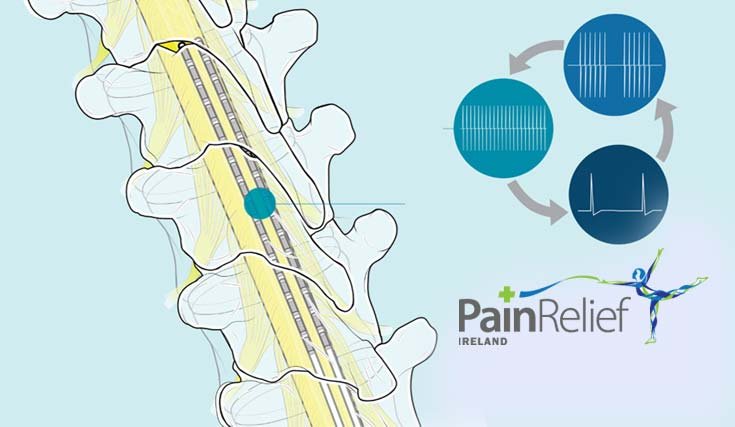In keeping with national guidelines Pain Relief Ireland is delighted to announce that it is now possible to resume implantation of spinal cord stimulators and other peripheral neuromodulation devices.
Dr. Dominic Hegarty, the clinical director of Pain Relief Ireland and leading implanter of these devices with over 12 years implanting experience says that the guidelines prepared by the International Neuromodulation Society1 are “helpful and very welcome”.
In fact resuming implantation could not have come soon enough for several individuals. “Unfortunately some of our patients were in the middle of their workup and others had their surgery postponed at short notice. We understand how difficult his had been” says Dr. Hegarty, “but everyone has been fantastic. They all realised the gravity of the situation at the time so we are delighted for them that we can re-launch the service”.
And it is needed! A recent national survey performed by NSUKI of 300 patients awaiting implants, revealed deterioration in pain, mental health, and patient’s ability to self-manage1. Some patients reported increases in pain medication and reliance on support network. 92% of the patients showed a willingness to attend for COVID-19 testing, self-isolate prior to and after surgery and undergo the procedure as soon as possible.
Dr. Hegarty was able to confirm that in order to accelerate therapy additional theatre space has been secured with the Mater Private Hospital in Cork over the next few weeks. Dr. Hegarty believes that while there will be strict adherence to COVID recovery guidelines we should take advantage of the low infection rate in the community before there is any surge later in the summer. There are several factors that shall be considered in each case. Pain Relief Ireland will follow the international neuromodulation society guidelines in conjunction with hospital and government policy on this matter.
1. Local COVID-19 situation
- The infection rates are at this point low and the risk is . The decision to resume elective implant surgery takes this into consideration. Resuming implantation will not place any extra demands on healthcare resources including theatre access, staffing, personal protection equipment, and risk to staff and patients is are low.
2. Prioritising Procedures
- Replacement of internal pulse generators (IPG), revision procedures, treatment of cancer pain and intractable neuropathic pain for which evidence based SCS treatment is available will be prioritised3.
- When prioritising patients3, clinical needs as well as patient’s own risk factors to acquiring COVID-19 infection6 will be taken into consideration.
- Interventions that do not fall within the categorisation will be assessed on an individual basis and a collaborative approach should be taken with other clinicians to guide prioritisation.
- It is important that the reasons for decision making in high risk cases are carefully documented, with at least two clinicians involved in the decision making process.
3. Reducing the risk to patients
- Non-invasive alternative treatments should be explored and discussed with the patients, before neuromodulation is considered.
- A robust MDT assessment as per NICE guidance TA159 on Spinal cord stimulation for chronic pain of neuropathic or ischaemic origin should be undertaken prior to implant surgery4. This may be difficult due to social distancing guidelines and may not be feasible for all patients. Where possible telemedicine should be used to reduce face to face consultation.
- A screening trial is widely used to determine whether a patient should receive permanent SCS implant. The evidence for patient benefit and prognostic value of screening trials is limited5. In order to minimise patient visits to hospital, the option of proceeding directly to a definitive procedure such as full implant with on table trial rather than first performing trial procedure will be planned. The risks and benefits of this will be discussed with the patient and documented.
- Services will follow local policy on the routine testing of patients for coronavirus and isolation prior to elective procedures and post-procedural isolation.
- Patients must understand their risks are greater if they are in an ‘at risk’, and ‘very high risk’ group of patients6.
- Use of local anaesthetic and conscious sedation may minimise risk of pulmonary complications as compared to general anaesthetic. Where feasible local anaesthesia and sedation should be used for implant surgery.
- The theatre turnaround time between the patients is going to be longer to allow social distancing for patients and staff, and the cleaning procedures after each case. Appropriate list planning process must be in place to avoid cancellations on the day of surgery and wasted visit to hospital for the patient with risk of exposure to COVID-19.
- As always post-implant education will involve patient and their carer. It is essential to have a plan on programming in advance to reduce future face to face attendance.
- As far as possible, post-operative wound monitoring, activation of the therapy and any other troubleshooting should be performed via telemedicine.
- Attempts must be made to facilitate implant surgery to be carried out as a day case surgery. Overnight stays will be arranged as needed
- Troubleshooting videos and information should be developed.
- Routine face to face follow-up of patients implanted in the past will be considered when troubleshooting could not be done via telemedicine.
4. Reducing risk to staff
- Patients having active symptoms of COVID-19 infection will have their procedure deferred unless there is an overriding clinical priority.
- Local protocols for appropriate PPE and social distancing should be followed.
- Where possible deep sedation or general anaesthesia requiring the potential need for airway support and subsequent aerosol generation should be avoided.
- Use of diathermy is an aerosol generating procedure, if possible, diathermy should be avoided or smoke evacuation for diathermy / other energy sources should be considered. If using diathermy even with smoke evacuation then local PPE guidance on aerosol generating procedures should be followed.
- Only minimum number of staff essential for surgery should be allowed in the operating theatres.
5. Reducing risk to industry partners
- Appropriate PPE as per local guidelines must be available.
- Social distancing protocols need to be maintained, except during actively imparting essential clinical care or monitoring.
- To minimise duration of stay in operating theatres, industry partners should only enter the theatre for the critical steps required during the procedure and should leave the theatre as soon as this is finished.
- Where possible remote programming and training of the patients to use devices should be undertaken.
- Post-implant programming visits should be kept to minimum.
- Where possible attendance of personnel from multiple companies during a single operating day should be avoided.
- Outpatient follow-ups should be very focused. The implanting team should have liaised with the patient and tried all attempts to troubleshoot via telemedicine. The implanting team should have a clear plan for face to face appointment and should communicate this clearly with industry partners before the appointment.
6. Consent
- It is recognised that face to face appointments to discuss the risks and benefits of treatment may not be in the best interests of patients and staff. However, it is important that the same principles of consent are followed, whether patients are spoken to on the telephone or by video call or in person.
- It is vital that patients understand the additional material risks of attending hospital and having surgery during the COVID-19 pandemic. This must be documented in the medical records.
- Written patient information on the additional risks of surgery during the COVID- 19 pandemic should be available to patients to aid the consent process. You may already have one in your hospital or may wish to use information and consent for patients undergoing implant surgery during the coronavirus pandemic developed by NSUKI.
- The guidance in the General Medical Council (GMC) publication ‘Consent: patients and doctors making decisions together’ must be followed7.
- It is vital that the person discussing the risks of a procedure with the patient is not only familiar with the risks/benefits of the procedure but also remains current on the risks and mortality from COVID-19.
Reference:
-
Gulve A, Baranidharan G, Eldable S, Sharma M, Bojonic, Mehta, Fitzgerald, Thomson S. Guidance on Resumption of Neuromodulation Services during the COVID-19 Recovery Phase. July 2020
-
Eldabe S, Baranidharan G, Gulve A, Thomson S, Hughes J, Vajramani G, Patel C, Love-Jones S, Fitzgerald J. Recommendations for the Management of Implanted Neurostimulation & Intrathecal Drug Delivery Devices During the COVID-19 Pandemic. https://nsuki.memberclicks.net
-
https://www.rcseng.ac.uk/coronavirus/surgical-prioritisation-guidance/
-
Spinal cord stimulation for chronic pain of neuropathic or ischaemic origin. https://www.nice.org.uk/guidance/ta159
-
Eldabe S, Durate R, Gulve A, Thomson S, Baranidharan G, Houten R, Jowett S, Sandhu H, Chadwick R, Brookes M, Kansal A, Earle J, Bell J, Robinson J, Walker S, Rhodes S, Taylor R. Does a screening trial for spinal cord stimulation in patients with chronic pain of neuropathic origin have clinical utility and cost-effectiveness (TRIALSTIM)? a randomised controlled trial.
-
https://www.cdc.gov/coronavirus/2019-ncov/need-extra-precautions/people- with-medical-conditions.html
-
Consent:patients and doctors making decisions together. https://www.gmc- uk.org/-/media/documents/gmc-guidance-for-doctors---consent---english_pdf 48903482.pdf?la=en&hash=588792FBA39749E57D881FD2E33A8519













